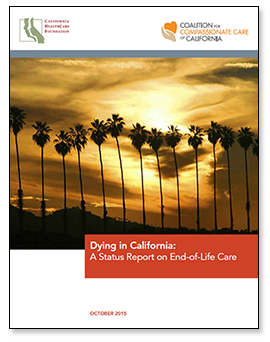SACRAMENTO, CA—A year after the release of a landmark report on death and dying in America, a new state-based report finds that California is making strides to create a more supportive environment for people facing serious illness.
 Dying in California: A Status Report on End-of-Life Care
Dying in California: A Status Report on End-of-Life Care – the first report of its kind – serves as a snapshot of the state’s progress in fulfilling five key recommendations laid out in the Institute of Medicine (IOM) report
Dying in America: Improving Quality and Honoring Individual Preferences Near the End of Life, released in September 2014.
Produced by the Coalition for Compassionate Care of California and the
California Health Care Foundation, the report is based on qualitative research and interviews with leaders in advance care planning and palliative care – specialized medical care that focuses on providing relief from the symptoms and stress of a serious illness.
Download the report from CHCF.org.
Among the findings:
Dying in California is organized by the core areas highlighted in the IOM report and covers: the delivery of end-of-life care, clinician-patient communication and advance care planning, professional education and development, policies and payment systems, and public education and engagement.
“California is actively working on and making progress in nearly all of the areas identified in the recommendations by the IOM,” said Judy Thomas, JD, CEO of the Coalition for Compassionate Care of California. “
Dying in California shows that our state is at the cutting edge of making the changes that need to happen in our healthcare system and society to be prepared for the future.”
Kate O’Malley, NP, RN, MS, senior program officer of high-value care for the California HealthCare Foundation, added, “Despite a generally positive direction, it’s too soon to declare victory. Changing the culture of care still requires heroic action by providers and individuals and their families. People with serious illness cannot reliably depend on getting the care they want in the setting of their choice, which is usually at home with loved ones.”
Judith R. Peres, LCSW-C, a member of the IOM committee that produced Dying in America, commended the new report and its findings. It “demonstrates areas where California is leading in the provision of comprehensive palliative care and is honest about areas in need of improvement,” she said. “Changes are needed throughout the health and social service system to avoid unwanted treatment and provide care in accord with a person’s values, goals, and preferences. I encourage other states to take California’s lead in this innovative use of the Dying in America report.”
Download Dying in California at CHCF.org.
Are you tweeting about this report? Use
#DyinginCA
Coalition for Compassionate Care of California
CCCC is a coalition of organizations, institutions, healthcare providers, state agencies and individuals working together to increase access to high-quality, compassionate palliative and end-of-life care for all people. Through advocacy, education, and resource development, CCCC works to ensure that organizations and communities have the information, knowledge and tools to expand access to quality care in the face of serious illness. CoalitionCCC.org
California Health Care Foundation
CHCF is leading the way to better care for all Californians, particularly those whose needs are not well served by the status quo. We work to ensure that people have access to the care they need, when they need it, at a price they can afford. CHCF informs policymakers and industry leaders, invests in ideas and innovations, and connects with changemakers to create a more responsive, patient-centered health care system. CHCF.org